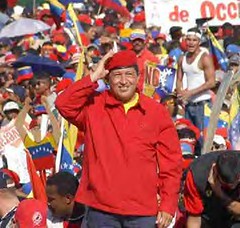
President Hugo Chavez among the Venezuelan masses. He recently won a landslide victory in the recent national elections.
Originally uploaded by Pan-African News Wire Photo File
Author: W.T. Whitney Jr People's Weekly World, May 29, 2008
BOOKREVIEW
Bush v. Chavez
Washington's War on Venezuela
By Eva Golinger
Monthly Review Press, 2008
160 pp., $15.95, paperback
Building on her earlier book "The Chavez Code" (Olive Branch Press, 2006), Eva Golinger has written "Bush vs. Chavez, Washington's War on Venezuela," a riveting, comprehensive rundown on continuing U.S. assaults against the Venezuelan government of President Hugo Chavez. Golinger is a lawyer living in Venezuela who grew up and was educated in the United States.
Golinger's new book has promise as an essential tool for anti-imperialist struggle. It covers U.S. preparations for undoing a targeted government that surface en route rather than through post mortem studies. She cites Guatemala (1954), Indonesia (1965), Chile (1973) and Haiti (2004) as examples of the latter.
With declassified documents obtained under the Freedom of Information Act from U.S. agencies, Golinger used her first book to document U.S. funding and facilitation of the failed April 2002 coup that briefly removed President Chavez from office. "The Chavez Code" also covered the lockout and sabotage campaign paralyzing the state oil company later that year.
Golinger this time provides an update. She notes Washington's creation of an Office of Transition Initiatives (OTI) to support the oil strike and the anti-Chavez recall referendum of 2004. Golinger records U.S. diplomatic and media offensives against Venezuela, and also internal subversion and military posturing. Again she relies upon released declassified documents, along with a variety of other sources and her own investigations.
The book follows the money trail. From 2001 on, the National Endowment for Democracy (NED) distributed $1 million annually among anti-Chavez groups, dispensing $1 million more after the failed 2002 coup. The U.S. Agency for International Development (USAID) budgeted over $2 million that year to nurture OTI support for the oil strike. Tracking money since then, Golinger shows that in 2003 the NED and the OTI gave out $1 million and $5 million respectively, the combined totals reaching $27 million by early 2005. They exceeded $10 million in 2005-2007.
"Bush vs. Chavez" elucidates shifts of U.S. strategy. On the diplomatic front, high Washington officials unleashed serious accusations against Venezuela. They condemned Venezuela's supposed military buildup and alleged recalcitrance in confronting drug traffickers. They charged the Chavez government with ties to nations cozy with terrorists. Golinger characterizes the anti-Venezuela international media campaign and internal distribution of anti-government literature, especially to military units, as manifestations of psychological warfare.
U.S. formation of a spy network was aimed at subversion, as was exploitation of separatist tendencies in the oil-rich state of Zulia. Zulia's governor, Manuel Rosales, closely associated with former U.S. ambassador William Brownfield, ran against Chavez in the 2006 presidential contest. In 2001, under NATO auspices, the U.S. military launched Plan Balboa, a barely fictitious military exercise carried out in Spain involving an invasion seemingly of Venezuela through Zulia by U.S. troops.
Lastly, Golinger highlights U.S. military threats against Venezuela, direct and tangential. Among them were Colombian paramilitary infiltration across the Venezuelan border, paramilitary training camps in Florida, and a major amphibian assault exercise in 2005 on the Dutch island of Curaçao, located off Venezuela's northern coast. The following year Curaçao saw a growing presence of U.S. military personnel and U.S. companies. Renewed military exercises involved an aircraft carrier, other warships, 85 planes and 7,000 troops.
The State Department has published an essay, according to Golinger, proposing that Curaçao plus the nearby islands of Bonaire and Aruba form a new geopolitical border for the United States.
Pointing out that Venezuela is far from alone in receiving unwelcome U.S. attention, Eva Golinger reminded a Venezuelan radio audience April 24 that U.S. operatives in Bolivia have dispensed $129 million since 2005 to opponents of President Evo Morales.
One quibble regarding this useful, well-executed book is that the title, highlighting personalities, gives short shrift to broader forces engaged in the drama. For more information about Eva Golinger, see http://www.chavezcode.com
atwhit@roadrunner.com
No comments:
Post a Comment